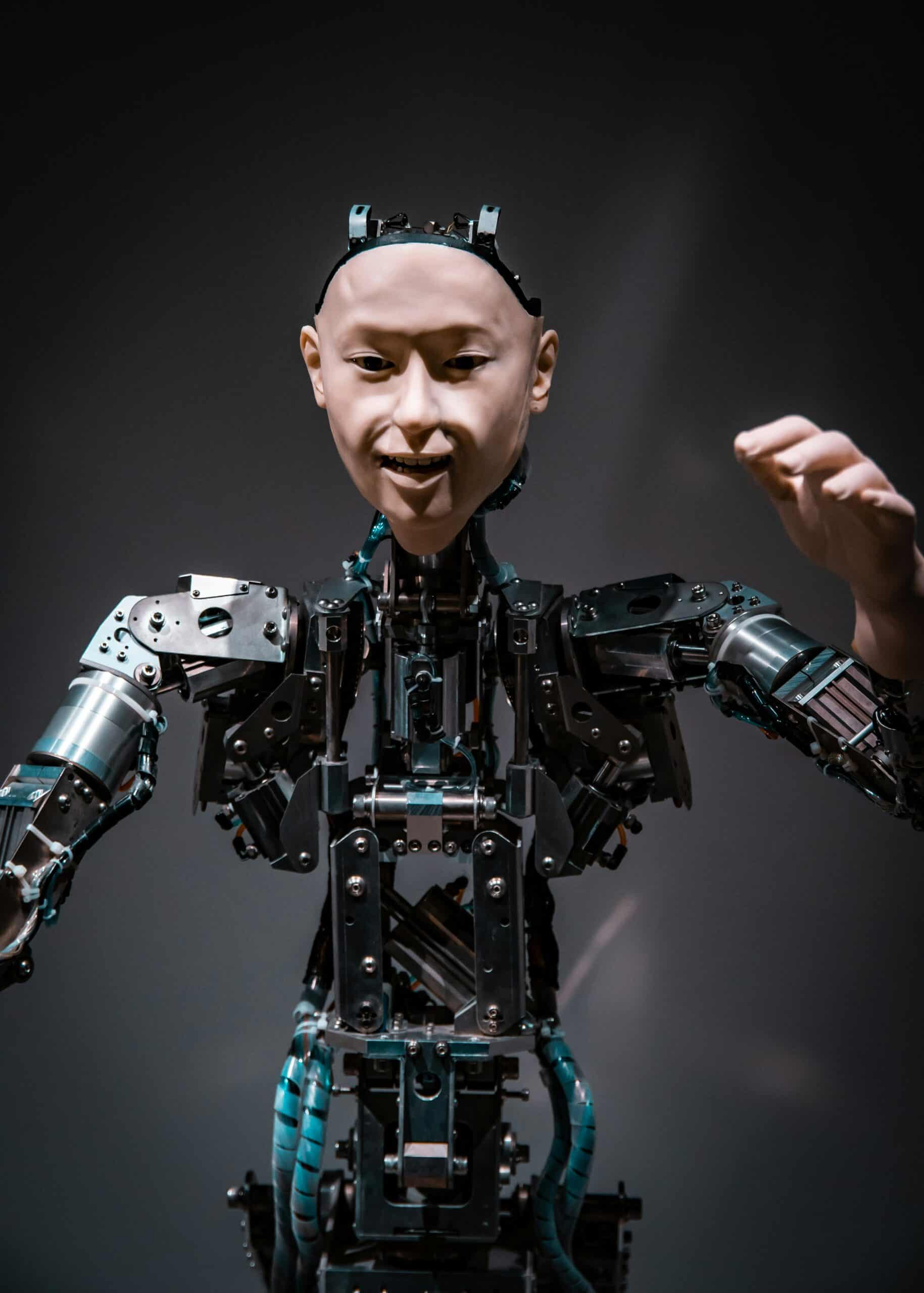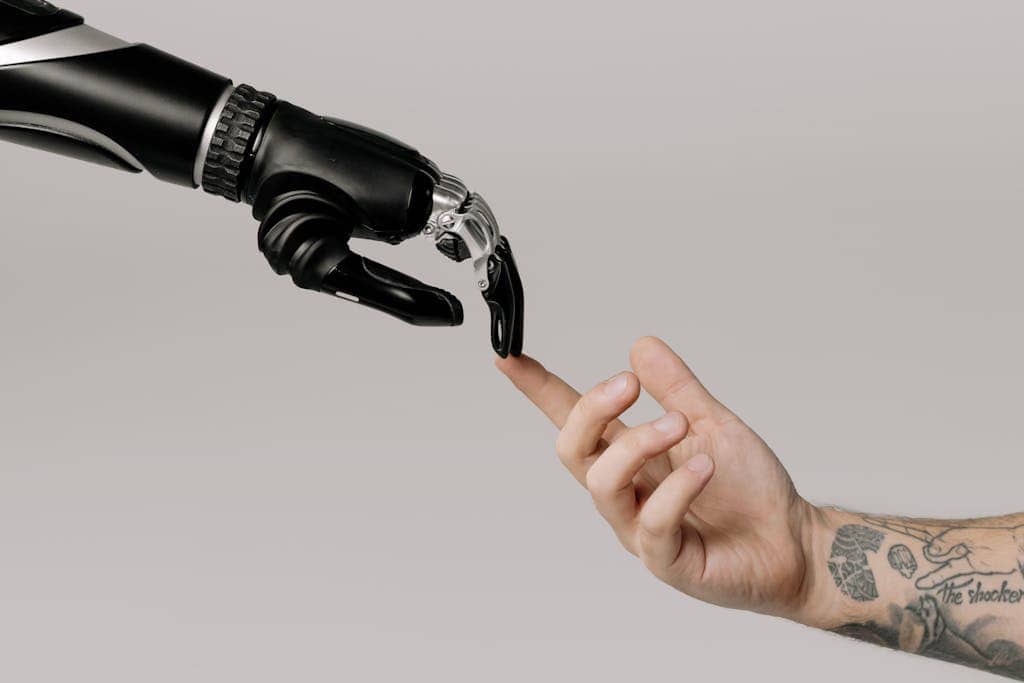Understanding AI in Personal Development
AI Overview
Artificial Intelligence (AI) is a branch of computer science that focuses on creating systems capable of performing tasks that typically require human intelligence. These tasks include problem-solving, learning, language understanding, and perception. When it comes to personal development, AI can be a game-changer, offering a range of personalized solutions that make self-improvement more accessible and efficient (TheBlogRelay).

Importance of AI in Personal Growth
One of the key aspects of artificial intelligence in self-improvement is its ability to offer personalized recommendations and learning paths based on vast amounts of data and individual preferences. This customization helps individuals to better focus on their specific goals and objectives, enhancing the overall learning experience.
Imagine having a personal coach that knows you inside out—your strengths, weaknesses, learning style, and even the areas you need to improve. AI can provide that level of personalization. For example, AI-driven platforms can offer tailored learning paths and adaptive learning programs, allowing lifelong learners like you to tackle new topics at your own pace and in a way that suits you best.
| AI in Self-Improvement | Benefits |
|---|---|
| Personalized Learning Programs | Tailored to individual goals and preferences |
| Self-Improvement Tools | Efficient identification and pursuit of personal goals |
| AI-Powered Mindfulness Apps | Personalized feedback for mental well-being |
| Data-Driven Recommendations | Enhanced learning experiences and outcomes |
In the realm of mental health, AI-powered mindfulness and meditation apps utilize machine learning algorithms to provide personalized feedback and recommendations. These tools can significantly improve your mental health and overall well-being by offering exercises and tips tailored to your emotional state (LinkedIn).
It’s important to note, though, that while AI offers innovative and efficient solutions for personal development, it doesn’t replace the need for human interaction and support. Human empathy and mentorship still play a critical role in achieving personal growth and self-improvement (LinkedIn).
By understanding the role of artificial intelligence in self-improvement, you can better leverage these technologies to enhance your learning journey. Whether through machine learning for self-help or AI-driven personal development strategies, the possibilities are endless.
Ethical Considerations of AI
Exploring the ethical implications of artificial intelligence is crucial in personal development and self-improvement. It ensures that AI technologies are both helpful and fair.
Bias in AI Systems
AI systems can perpetuate bias present in their training data, leading to discriminatory outcomes in many vital areas. These biases can have significant impacts in sectors such as hiring, lending, and criminal justice. For instance, if an AI system is trained on a dataset that includes biased information, it may unfairly favor or disadvantage certain groups.
| Sector | Potential Bias Impact |
|---|---|
| Hiring | Unfair candidate selection |
| Lending | Discriminatory loan approvals |
| Criminal Justice | Inequitable sentencing |
It’s essential to acknowledge these biases when leveraging AI for self-improvement. For those interested in exploring AI’s potential in personal growth, learn more about machine learning for self-help.
Transparency in Decision-Making
Transparency in AI systems, particularly in sensitive domains like healthcare or autonomous vehicles, is paramount. Understanding how AI makes decisions allows us to assign responsibility and accountability. Explainable AI models are being developed to address the challenges of interpretability.
Clear and transparent AI systems help users trust the technology. When AI is used for personalized feedback or guidance in self-improvement, understanding the decision-making process enhances its effectiveness and acceptance.
- Robust Data Privacy: AI models often require large volumes of personal data, which raises concerns about how this data is collected, processed, and stored. Privacy issues can arise, especially if AI is used for surveillance (CompTIA).
- Ethical AI Use: Law enforcement’s use of AI for surveillance can infringe upon individual privacy rights. Ensuring robust safeguards against data breaches and unauthorized access is critical to preserving privacy and human rights.
Exploring these ethical considerations ensures that we use AI responsibly in personal development. For more on how to use AI ethically in personal growth, you might find our articles on using AI for self-improvement and ai-driven personal development strategies insightful.
Applications of AI in Various Sectors
AI is revolutionizing many fields, adapting innovative approaches to improve efficiency and outcomes. Here, I look into three primary areas: education, healthcare, and agriculture.
AI in Education
In the education sector, artificial intelligence is making personalized learning more accessible and effective. AI-powered tools can create course curricula tailored to my interests, goals, and learning preferences. This leads to a more customized and engaging learning experience.
| Feature | Description |
|---|---|
| Personalized Curriculum | Tailored to individual interests and goals |
| Learning Preferences | Identifies aptitudes and preferences for effective learning |
| Adaptability | Adjusts in real-time based on performance |
Resources such as machine learning for self-help guide me through adaptive learning tools that further enhance personal development.
AI in Healthcare
The healthcare industry is benefiting immensely from AI solutions. Deep learning algorithms assist in detecting diseases, recommending diagnostic or treatment options, drug discovery, and monitoring devices for remote care.
| Application | Benefit |
|---|---|
| Disease Detection | Early and accurate identification of conditions |
| Diagnostic Recommendations | Data-driven treatment options |
| Remote Care | Expands access through monitoring technologies |
AI lowers costs and expands access to services, ensuring timely and precise healthcare. For a deeper dive, you can explore using AI for self-improvement in healthcare applications.
AI in Agriculture
AI is transforming agriculture through precision farming. Applications detect droughts, pest infestations, or disease outbreaks and provide targeted recommendations for optimal water, fertilizer, and pesticide usage (California Miramar University).
| Feature | Description |
|---|---|
| Precision Farming | Optimizes resources for better yield |
| Drought Detection | Identifies and mitigates water stress |
| Pest and Disease Management | Early detection and targeted treatments |
These tools enhance the efficiency of crop management, leading to higher yields and sustainable practices. Exploring ai-driven personal development strategies can offer more insights into how AI aids in personal development across various sectors.
By exploring diverse applications of AI, I gain a holistic understanding of how artificial intelligence enhances personal development and self-improvement. For more detailed strategies, consider ai solutions for self-motivation.
Leveraging AI for Self-Improvement
Artificial intelligence (AI) has become a powerful tool for personal development. In my quest to enhance my skills and knowledge, I’ve found that AI can be incredibly helpful in providing adaptive learning programs and personalized feedback.

Adaptive Learning Programs
Adaptive learning programs use AI algorithms to tailor educational content to my unique needs and preferences. By identifying my learning preferences and aptitudes, AI helps create customized learning experiences that are more effective and engaging. According to Claned, students who used adaptive learning programs driven by AI saw a 62% increase in test scores.
| Adaptive Learning Benefits | Percentage Improvement |
|---|---|
| Test Score Increase | 62% |
These programs adjust the difficulty of tasks based on my progress and provide me with resources that cater to my specific learning style. This means I get a learning path that evolves with me, ensuring that I’m always challenged but not overwhelmed. Check out our [ai-driven personal development strategies] page for more insights on how to leverage AI for learning.
Personalized Feedback and Guidance
AI is also instrumental in providing personalized feedback and guidance. With AI-powered tools like chatbots and virtual coaches, I receive tailored advice that helps me navigate my personal development journey. For instance, AI-enhanced chatbots can provide personalized guidance with 91% accuracy (Claned).
| Personalized Guidance Tool | Accuracy |
|---|---|
| AI-enhanced Chatbots | 91% |
Using natural language processing and machine learning algorithms, these virtual mentors offer insights and actionable feedback, significantly improving my performance. This support includes setting goals, tracking progress, and offering resources to help me achieve my aspirations.
By leveraging AI for self-improvement, I can access a wealth of tailored advice and learning opportunities that make my personal growth journey more effective and enjoyable. For more tips on using AI to enhance your development, visit our using ai for self-improvement page.
Impact of AI on Job Roles
Artificial intelligence (AI) is reshaping job roles across various industries, creating both opportunities and challenges. Let’s delve into two main concerns associated with AI: automation and job displacement.
Automation Concerns
I’ve read that AI’s ability to automate tasks can lead to efficiency gains but also raises significant concerns. For instance, AI-driven chatbots in the human resource sector can automate resume screening, interview scheduling, and candidate assessments. Companies like IBM are already using AI-powered platforms to analyze resumes and identify the most suitable candidates, reducing time and effort in the hiring process.
| Task | Automation Potential (%) |
|---|---|
| Resume Screening | 95% |
| Interview Scheduling | 90% |
| Candidate Assessments | 85% |
These efficiencies highlight why companies are keen on integrating AI, but this automation doesn’t only impact operational roles; it can extend to areas crucial to personal growth, like self-improvement strategies. For example, AI-driven tools can provide tailored advice and performance monitoring, complementing traditional methods such as mentorship and self-reflection. This effectiveness can be beneficial but potentially replaces some human-centered roles.
Job Displacement Risks
AI’s ability to replace human labor has understandably led to concerns about job displacement. According to CompTIA, 81% of U.S. workers have seen articles focusing on workers being replaced by AI, with 3 out of 4 workers expressing concern about the impact of automated technologies on the workforce. The fear isn’t unfounded, as entire job categories could be rendered obsolete. Here is a glimpse of sectors most at risk:
| Sector | Risk of Job Displacement (%) |
|---|---|
| Manufacturing | 85% |
| Retail | 70% |
| Customer Service | 65% |
| Data Entry | 60% |
For lifelong learners like myself, the presence of AI means keeping abreast of these trends while seeking new skills and pathways for personal development. AI can also provide new opportunities – for instance, learning platforms can now offer tailored learning paths and AI-driven personal development strategies that align with individual goals.
While AI’s potential for automation and job displacement raises valid concerns, it also offers pathways for advancement in personal growth. Leveraging AI responsibly and balancing it with human interaction can help us harness its full potential without sacrificing the human touch.
Personalized Learning with AI
In the realm of personal development, artificial intelligence (AI) offers exciting opportunities for lifelong learners. Personalized learning paths and AI-driven tutoring systems are two key areas where AI excels in self-improvement.
Tailored Learning Paths
AI-powered tools can create course curricula tailored to learners’ interests, goals, and learning styles by analyzing personal preferences and aptitudes (Claned). This customized approach enhances the learning experience, making it more effective and engaging. By leveraging AI, I can receive a custom curriculum that addresses my unique learning needs and goals.
| Feature | Benefit |
|---|---|
| Personalized Curriculum | Matches individual interests and goals |
| Enhanced Engagement | Keeps learners motivated |
| Efficient Learning | Focuses on areas of improvement |
AI helps identify my strengths and weaknesses, allowing for a more focused and efficient learning experience. For more information on using AI for self-improvement, visit our dedicated page.
AI-driven Tutoring Systems
AI-driven tutoring systems use natural language processing and machine learning algorithms to provide personalized feedback and guidance. AI-powered chatbots and virtual tutors can offer help with 91% accuracy, indicating high efficacy in supporting learners.
| AI Feature | Function |
|---|---|
| Chatbots | Provide real-time feedback |
| Virtual Tutors | Offer personalized guidance |
| Adaptive Learning | Modifies content based on performance |
With these technologies, I can receive instant assistance and tailor my study plan to ensure continuous improvement. Explore more on AI-driven personal development strategies for detailed insights.
For language learning, AI-enhanced language programs enable faster and more effective acquisition of new languages by offering personalized feedback. This approach helps me learn languages at my own pace, addressing my specific learning needs.
By embracing AI in personal development, lifelong learners can harness the power of machine learning for self-help to reach their full potential. Discover various AI solutions for enhancing self-motivation and success here.
AI in Mental Health and Well-being
Artificial intelligence has revolutionized personal development, and one of the most profound impacts has been in the domain of mental health and well-being. As lifelong learners, discovering new approaches to enhance life using AI tools is essential. The incorporation of AI in mindfulness and meditation apps, as well as its role in promoting emotional wellness, offers promising avenues for self-improvement.
Mindfulness and Meditation Apps
AI-powered mindfulness and meditation apps are transforming mental wellness routines. These applications use machine learning algorithms to provide personalized feedback and recommendations, enhancing mental health (LinkedIn). They analyze user behavior and preferences to deliver tailored meditation sessions, making the practice more effective and engaging.
Popular AI-enhanced mindfulness and meditation apps include:
| App Name | Key Features | AI Use |
|---|---|---|
| Calm | Personalized meditation sessions, sleep stories | Machine learning-based recommendations |
| Headspace | Guided meditations, mindful workouts | AI-driven adaptive learning |
| Aura | Meditation, life coaching, stories | Natural language processing for user feedback |
These apps not only offer guided meditations but also track progress and adjust sessions based on individual needs. By continuously learning from user interactions, they aim to foster a consistent and beneficial mindfulness practice. For more information on how AI can assist in self-improvement, explore our dedicated article.
Promoting Emotional Wellness
AI is also making strides in promoting emotional wellness. Many mental health apps utilize natural language processing (NLP) and machine learning algorithms to provide personalized guidance and support, helping individuals understand and manage their emotions and behaviors.
AI-driven mental health platforms offer virtual coaching and mentorship. These virtual coaches provide feedback, help set and achieve goals, and offer resources for personal development (Medium). By analyzing user input and emotional state, these platforms can offer tailored advice that resonates with individual needs.
Some impactful AI-driven mental health tools include:
| Tool Name | Key Features | AI Use |
|---|---|---|
| Woebot | Chatbot for emotional support, daily check-ins | NLP for user interaction |
| Wysa | AI-based chat for mental health, self-care exercises | Machine learning to analyze emotional state |
| Replika | Conversational AI, personal growth insights | NLP and machine learning for recommendations |
The use of AI in these applications highlights the potential for technology to aid in emotional wellness. By providing accessible, personalized support, AI is helping users navigate their mental health journeys. To learn more about how machine learning can be a powerful tool for self-help, visit our article on machine learning for self-help.
Integrating AI into your mental wellness routine can offer insightful and effective strategies for self-improvement. Whether it’s through mindfulness apps or emotional wellness platforms, AI’s role in personal development is undeniable. For further reading on AI-driven personal development strategies, consider our related content on ai-driven personal development strategies.
Balancing AI and Human Interaction
Role of Human Support
When it comes to personal growth, human support plays a crucial role. While artificial intelligence in self-improvement offers numerous benefits, it’s essential to remember the value of real human interactions. I found that mentors, coaches, and friends provide emotional support, insights, and encouragement that AI systems cannot fully replicate.
- Emotional Connection: Professional relationships and personal connections offer empathy and understanding that AI systems lack. These relationships are vital for emotional well-being.
- Insights and Experience: Humans bring unique perspectives and experiences to the table, which can enrich my personal development journey.
- Accountability: Having someone to hold me accountable can make a big difference in achieving my self-improvement goals.

Augmenting Personal Development with AI
AI has made significant strides in enhancing personal development. By leveraging AI, I can gain insights and guidance tailored specifically to my needs.
- Adaptive Learning Programs: AI-driven platforms can recommend personalized learning paths based on my progress and preferences. For more on AI-powered learning, check out ai-driven personal development strategies.
- Personalized Feedback and Guidance: Using machine learning, AI systems analyze my data and provide customized feedback. This helps me focus on areas that need improvement. For instance, AI-powered mindfulness and meditation apps offer personalized recommendations for improving mental health.
| Feature | AI Capabilities |
|---|---|
| Personalized Learning Paths | Adaptive to user progress |
| Customized Feedback | Based on data analysis |
| Mental Health Support | Tailored mindfulness and meditation |
By blending the strengths of AI with human support, I can create a balanced approach to self-improvement. To explore more about how AI can aid personal growth, read about machine learning for self-help and using AI for self-improvement.






2 Comments
Comments are closed.